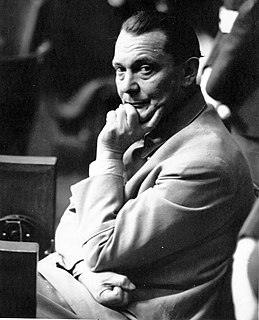A Quote by Thomas Nagel
Altruism itself depends on a recognition of the reality of other persons, and on the equivalent capacity to regard oneself as merely one individual among many.
Quote Topics
Related Quotes
We ought, all of us, to realize each other in this intense, pathetic, and important way. If you say that this is absurd, and that we cannot be in love with everyone at once, I merely point out to you that, as a matter of fact, certain persons do exist with an enormous capacity for friendship and for taking delight in other people's lives; and that such persons know more of truth than if their hearts were not so big.
Love of peace is common among weak, short-sighted, timid, and lazy persons; and on the other hand courage is found among many men of evil temper and bad character. Neither quality shall by itself avail. Justice among the nations of mankind, and the uplifting of humanity, can be brought about only by those strong and daring men who with wisdom love peace, but who love righteousness more than peace.
The people were merely to acknowledge the authority of the Fuehrer, or, let us say, to declare themselves in agreement with the Fuehrer. If they gave the Fuehrer their confidence then it was their concern to exercise the other functions. Thus, not the individual persons were to be selected according to the will of the people, but solely the leadership itself.
I regard large inherited wealth as a misfortune, which merely serves to dull men's faculties. A man who possesses great wealth should, therefore, allow only a small portion to descend to his relatives. Even if he has children, I consider it a mistake to hand over to them considerable sums of money beyond what is necessary for their education. To do so merely encourages laziness and impedes the healthy development of the individual's capacity to make an independent position for himself.
The results of life are uncalculated and uncalculable. The years teach much which the days never know. The persons who compose our company, converse, and come and go, and design and execute many things, and somewhat comes of it all, but an unlooked for result. The individual is always mistaken. He designed many things, and drew in other persons as coadjutors, quarrelled with some or all, blundered much, and something is done; all are a little advanced, but the individual is always mistaken. It turns out somewhat new, and very unlike what he promised himself.
Every acceptance of suffering is an acceptance of that which exists. The denial of every form of suffering can result in a flight from reality in which contact with reality becomes ever thinner, ever more fragmentary. It is impossible to remove oneself totally from suffering, unless one removes oneself from life itself, no longer enters into relationships, makes oneself invulnerable.
The Criteria of Emotional Maturity: The ability to deal constructively with reality The capacity to adapt to change A relative freedom from symptoms that are produced by tensions and anxieties The capacity to find more satisfaction in giving than receiving The capacity to relate to other people in a consistent manner with mutual satisfaction and helpfulness The capacity to sublimate, to direct one's instinctive hostile energy into creative and constructive outlets The capacity to love.
Plot involves fragmentary reality, and it might involve composite reality. Fragmentary reality is the view of the individual. Composite reality is the community or state view. Fragmentary reality is always set against composite reality. Virginia Woolf did this by creating fragmentary monologues and for a while this was all the rage in literature. She was a genius. In the hands of the merely talented it came off like gibberish.







































